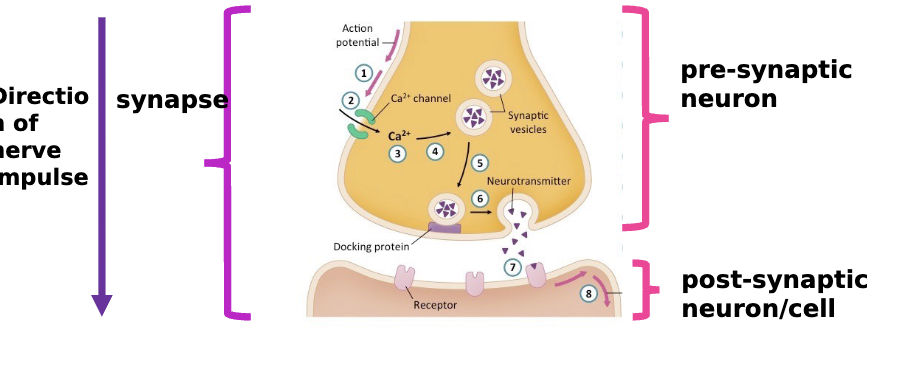C2.2 Neural signalling
C2.2.1 Neurons as cells within the nervous system that carry electrical impulses
Students should understand that cytoplasm and a nucleus form the cell body of a neuron, with elongated nerve fibres of varying length projecting from it. An axon is a long single fibre. Dendrites are multiple shorter fibres. Electrical impulses are conducted along these fibres
neurons
cells within the nervous system that carry electrical impulses
makes up the nervous system
dendrites - short branched fibres that convert chemical info into electrical signals
axons - an long single fibre that transmits electical signals to terminal regions for communication with other neurons
soma - a cell body containing the nucleus cytoplasm and organelles, where essential metabolic processes occur to mantain cell survival
in some nuerons, the axons may be surrounded by an insulating layer known as the myelin sheath
the myelin sheath improves the conduction speed of electrical impulses along the axon but it requires additional spance and energy myelin sheath
C2.2.2—Generation of the resting potential by pumping to establish and maintain concentration gradients of sodium and potassium ions
Students should understand how energy from ATP drives the pumping of sodium and potassium ions in opposite directions across the plasma membrane of neurons. They should understand the concept of a membrane polarization and a membrane potential and also reasons that the resting potential is negative
Resting potential:
The voltage difference inside and outside the cell
approx -70mV
inside relatively more negative than outside
electrochemical gradient
Maintained by
Na/K pumps using ATP because it works against a concentration gradient
3 Na+ gets moved out and 2 K+ gets in
The membrane is more permeable to K+ than Na+ because of concentration gradients.
Pumped ions will leak back across the membrane through diffusion but it is slow.
C2.2.3 – Nerve impulses as action potentials that are propagated along nerve fibres
Action potential: rapid change in membrane potential
Nerve impulse: action potential that starts at the dendrites of a neuron and is propagated along the axon to the synapse of the neuron. Its an electrical signal involving the movement of postively charged ions.
Sodium channels will fail to open if the threshold is not met and the action potential will fail to be propagated. It is either a complete depolarisation or no depolarisation; “ an all for nothing “ process
Action potential has 2 phases
Depolarisation: negative to positive inside the neuron
Repolarisation: positive to negative inside the membrane
Depolarisation:
Na+ channels open and ions diffuse in the neuron down a concentration gradient.
inside more positive raising value to +30mV
Re-polarisation:
Na+ channels close, K+ channels open
K+ ions diffuse out of neuron down concentration gradient
makes it negative to -80mV
Refractory period:
after the nerve impulse
Na/K pump restoring resting potential
steps of a nerve impulse
resting potential is -70mv
sodium potasium pumps maintain the resting potential when more sodium ions are outside and more potassium ion are inside
when a neuron is stimulated, sodium ion channels open
sodium ions diffuse in causing depolarisation (thats the signal)
a nerve impulse is sent as a wave of depolarisation along the membrane
potassium ion channels open
potassium ions diffuse out causing repolarisation
sodium potassium pumps re-establish the resting potential
Variation in the speed of nerve impulses
in humans the diameter is usually 1 micrometer with a speed of approximated 1 meter per second
in squid the diameter is typically 500 micrometer and has a speed of 25 meters per second
and the reasons why they have giant axons is so there’s a rapid response to danger but the downside is that they take more space and resources
C2.2.5 Synapses as junctions between neurons and effector cells
Synapses are junctions between cells in the nervous system
between neurons and receptors
between muscle fibres and glands, otherwise known as effectors
converts electrical signals to chemical signals at the synapse
the gap is called the synaptic clef and it is fluid-filled so no elecric impulses can pass across
signals can only cross the synapse in one direction
C2.2.6 Release of neurotransmitters from a presynaptic membrane
nerve impulse transmitted until the end of the neuron and presynaptic membrane
Depolarisation of presynaptic membrane
Ca2+ diffuse through channels in neuron
Ca2+ with neurotransmitters move to presynaptic membrane and fuse with docking proteins
Neurotransmitter is released via exocytosis
Neurotransmitters diffuse across synaptic gap
Neurotransmitters bind to receptors in postsynaptic membrane and opens ion channels
Ion diffusion across membrane which may trigger action potential
example of a neurotransmitter is acetylcholine
produced as the pre-synaptic neuron by combinding choline and acetyl
Acetylcholine is loaded into vesicles and then released into the synaptic cleft during synaptic transmission. Receptors for acetylcholine in the post-synaptic membrane have a binding site to which acetylcholine will bind. Acetylcholine remains bound only for a short time. During this time one action potential is initiated in the post-synaptic neuron. This happens because the enzyme acetylcholinesterase is present in the synaptic cleft and breaks down acetylcholine into choline and acetate. Choline is reabsorbed into the pre-synaptic neuron and here it is reconverted back into active neurotransmitter

Myelination
made of the phospholid bilayer (fatty acid) and acts as an insulator
Schwann cells lay down the layers of phospholipids
its really important because they speeed up and can increase up to 100 meters per second
myelin and insulation can be generated much much faster, improves reaction time
disadvantage is that it does take up a lot of space